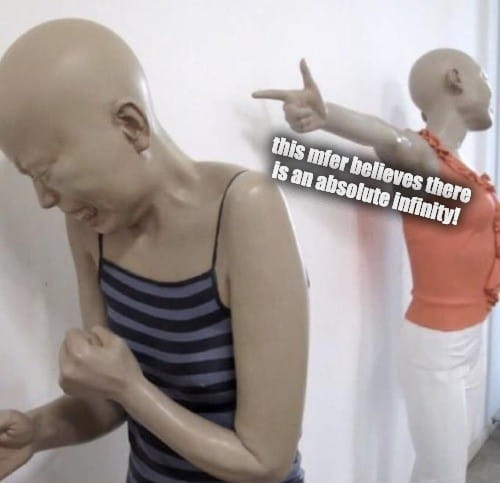this post was submitted on 30 Apr 2024
229 points (93.9% liked)
Science Memes
11426 readers
2890 users here now
Welcome to c/science_memes @ Mander.xyz!
A place for majestic STEMLORD peacocking, as well as memes about the realities of working in a lab.

Rules
- Don't throw mud. Behave like an intellectual and remember the human.
- Keep it rooted (on topic).
- No spam.
- Infographics welcome, get schooled.
This is a science community. We use the Dawkins definition of meme.
Research Committee
Other Mander Communities
Science and Research
Biology and Life Sciences
- !abiogenesis@mander.xyz
- !animal-behavior@mander.xyz
- !anthropology@mander.xyz
- !arachnology@mander.xyz
- !balconygardening@slrpnk.net
- !biodiversity@mander.xyz
- !biology@mander.xyz
- !biophysics@mander.xyz
- !botany@mander.xyz
- !ecology@mander.xyz
- !entomology@mander.xyz
- !fermentation@mander.xyz
- !herpetology@mander.xyz
- !houseplants@mander.xyz
- !medicine@mander.xyz
- !microscopy@mander.xyz
- !mycology@mander.xyz
- !nudibranchs@mander.xyz
- !nutrition@mander.xyz
- !palaeoecology@mander.xyz
- !palaeontology@mander.xyz
- !photosynthesis@mander.xyz
- !plantid@mander.xyz
- !plants@mander.xyz
- !reptiles and amphibians@mander.xyz
Physical Sciences
- !astronomy@mander.xyz
- !chemistry@mander.xyz
- !earthscience@mander.xyz
- !geography@mander.xyz
- !geospatial@mander.xyz
- !nuclear@mander.xyz
- !physics@mander.xyz
- !quantum-computing@mander.xyz
- !spectroscopy@mander.xyz
Humanities and Social Sciences
Practical and Applied Sciences
- !exercise-and sports-science@mander.xyz
- !gardening@mander.xyz
- !self sufficiency@mander.xyz
- !soilscience@slrpnk.net
- !terrariums@mander.xyz
- !timelapse@mander.xyz
Memes
Miscellaneous
founded 2 years ago
MODERATORS
you are viewing a single comment's thread
view the rest of the comments
view the rest of the comments

I'm not sure anyone has really provided a complete explanation of what is the difference between working with an absolute infinity and the way we do math normally in science and such.
Basically, no one has found the idea of using an absolute infinity to explain the world to be better than the way we deal with infinity in college courses. In college, you run across the idea that some infinite sets are larger than others (countable numbers vs uncountable). Edit - I think you could have the idea of different sized infinities and a final largest absolute infinity. It’s just that this concept isn’t useful. It would be like claiming God is purple. Nobody can prove you wrong and it doesn’t matter.
Of course, an infinite set makes sense in math, and has practical uses in the sciences, but nothing can truly be demonstrated to be unending. Another poster put it nicely - infinity is a direction, not a destination.
I recommend this video How to count past infinity by Vsauce (about 20 minutes long). It is closer to entertainment than a lecture but its pretty good. I'm only an undergrad math major but I haven't found any real problems with this video (though, he does start talking about ordinal numbers which aren't terribly useful to anyone that I know of, yet, except for some really complicated number theory stuff cryptographers might use, don't ask me. cryptographers are basically wizards imho).